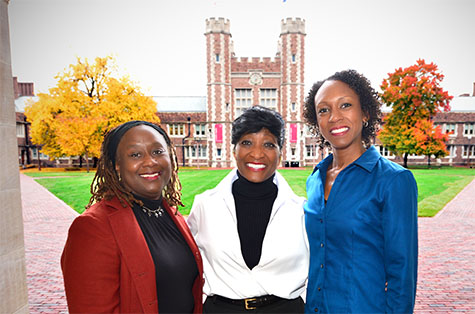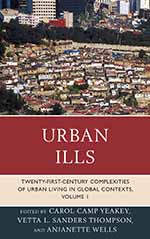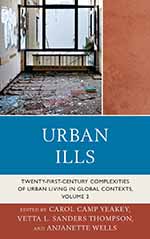
The 21st century is bringing challenges to urban areas like never before – widespread poverty and unemployment, public health issues, failing schools, natural disasters and economic disparities. It’s as if A Tale of Two Cities is being played out over and over again, in your neighborhood and in cities all over the world.

The problems are both local and global, and so are the solutions. It’s this context that has led three Washington University in St. Louis faculty to compile an impressive array of international scholarship in a two-volume book titled Urban Ills: Twenty-first-Century Complexities of Urban Living in Global Contexts.
The text, published this fall by Lexington Books in their Sociology, Philosophy and Criminal Justice series, is a “stock of ideas and insights for thinking afresh about solutions to the global human challenges of urban residents,” said Edward F. Lawlor, PhD, dean of the Brown School at WUSTL and the William E. Gordon Distinguished Professor.
“Not since Jane Jacobs’ publication of The Death and Life of American Cities has there been such interest, ferment, focus and analysis of the physical and social dynamics of cities in the U.S. and globally,” said Lawlor, who wrote the foreword.
Urban Ills is a collection of original research that focuses on critical challenges and dilemmas to living in cities. Its editors are Carol Camp Yeakey, PhD, professor in Arts & Sciences and founding director of the Interdisciplinary Program in Urban Studies and of the Center on Urban Research and Public Policy at WUSTL; Vetta Sanders Thompson, PhD, associate professor at the Brown School; and Anjanette Wells, PhD, assistant professor at the Brown School.
“There are books that look at certain nation-states, but to find those books that cross disciplinary lines, as well as continents and nation-states, is rather difficult,” Yeakey said. “So we decided to cross methodological, disciplinary and transcontinental boundaries and amass an impressive array of scholarship on pressing urban dilemmas.”
Research in the book is timely and contemporary and deals with issues that have affected cities in the last decade, including natural disasters and the recent recession. It is divided into two volumes. Volume 1 examines both the economic impact of urban life and the social realities of urban living. The chapters seek to explore emerging issues and trends affecting the lives of the poor, minorities, immigrants, women and children.

Volume 2 is devoted to the myriad issues involving urban health and the dynamics of urban communities and their neighborhoods. The chapters examine the most vulnerable populations suffering during and after the recession in the United States and around the world, and traditional issues of housing and employment with respect to these communities.
The editors have submissions from some of the most prominent scholars around the world. “ The emphasis on the interdisciplinary perspective is very strong, from practitioners in the field, to those in academia to those in government,” Wells said. “I really was impressed with the interdisciplinary contribution.”
The text was nearly three years in the making, and quite literally began at a collegial lunch among Washington University colleagues sharing ideas and talking about their work. Although Yeakey (urban studies), Sanders Thompson (public health, trained in psychology) and Wells (social work) were from different disciplines, among their findings were that the issues were both local and global.
“There are some problems that we have in the United States that we think of as global problems, but they happen right here in our own backyard,” Sanders Thompson said. “The book is a focal point for issues we have to start to deal with.”
With the emphasis on recent issues, the editors hope the book offers a roadmap on future solutions to problems facing cities. “It is instruction for where we’ve been and where we might go,” Sanders Thompson said. “It lays out that ‘we’ve been down this road before, here are the benefits, here are the consequences, here’s what we can create.
“We’ve got to be innovative, integrative and thoughtful about future action,” she said.
To learn more, visit here.